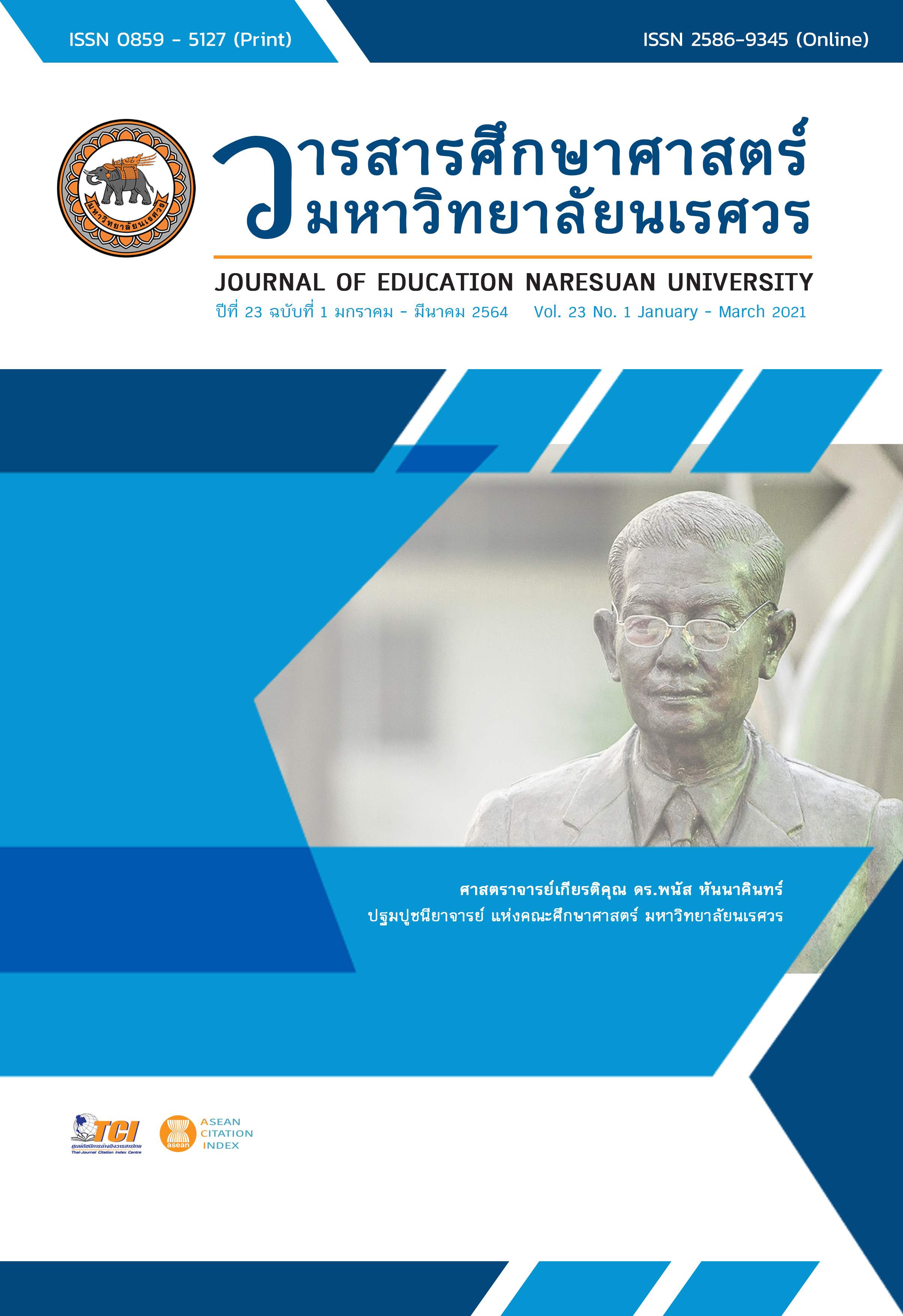ONLINE TEACHING FOR MUSIC PRACTICE SUBJECT BY APPLYING RICHARD ALLINGTON’S 6TS TECHNIQUE การเรียนการสอนออนไลน์วิชาปฏิบัติดนตรี โดยการประยุกต์ใช้ เทคนิค 6Ts ของ Richard Allington
Main Article Content
Abstract
With the application of 6Ts Techniques, this study aims to 1) develop online teaching method of Music Practice Subject and 2) evaluate the appropriateness of online teaching of Music Practice Subject. The participants of the study consist of 12 experts on Music Practice Subject teaching management. The participants are interviewed in order to earn the information for synthesis and teaching method development. The research tools are all online, including the interview form and the evaluation of online teaching of Music Practice Subject through 6Ts techniques. Data are analyzed by using mean and standard deviation. The results of the study reveal as follows;
1. The 6Ts techniques that are applied in the study consist of T1: short period teaching; T2: use of online media contents; T3: integration of technology for the benefits of learning; T4: icebreaking through conversations, encouragement for practices, and online communication; T5: assignment of the lessons that were taught focusing on self-study and self-practice, which students can report online; and T6: students’ opportunity to evaluate their works and encouragement of showing created works to public.
2. The result of the appropriateness evaluation of Online Teaching for Music Practice Subject with 6Ts techniques is found in the high level ( = 4.23, S.D. = 0.35) In addition, there is a suggestion from the interview that Online Teaching for Music Practice Subject by Applying Richard Allington’s 6Ts Technique should be individualized instruction, because it is more effective than group learning.
Article Details
The owner of the article does not copy or violate any of its copyright. If any copyright infringement occurs or prosecution, in any case, the Editorial Board is not involved in all the rights to the owner of the article to be performed.
References
Allington, R. (2002). What I've learned about effective reading instruction: From a decade of studying exemplary elementary classroom teachers. Phi Delta Kappan, 83, 740-747.
Cash, C. D., Allen, S. E., Simmons, A. L., & Duke, R. A. (2014). Effects of model performances on music skill acquisition and overnight memory consolidation. Journal of Research in Music Education, 62(1), 89–99.
Khuankaew, J. (2017). Satisfaction in using information media in flipped classroom concept design. FEU Academic Review Journal, 11(4), 293-303. [in Thai]
Mahithithammathorn, P., & Treemas, C. (2019). A study of online instructional packages for electric guitar using demonstration. An Online Journal of Education, 14(2), 1-10. [in Thai]
Maneetong, P. (2014). The knowledge transfer of “Salor Sor Sueng” band of local music band. Journal of Social Academic, 7(1), 27-42. [in Thai]
Meearsa, J., & Suttachit, N. (2017). Guidelines the instruction management of classical saxophone practical skills course in music program, bachelor degree. An Online Journal of Education, 12(4), 157-168. [in Thai]
Muangkaew, K. (2018). Factors affecting self-development behaviors of students in Silpakorn University, Sanam Chandra Palace Campus. Veridian E-Journal, Silpakorn University, 11(2), 197-215. [in Thai]
Muernpho, S. (2017). Develop academic achievement and attention among students using self-assessment. Ramkhamhaeng University Journal Humanities Edition, 36(2), 139-156. [in Thai]
Na Nongkhai, L., & Keawkiriya, T. (2016). A development of the learning method of problem-based learning with cooperative learning on cloud computing by Google Apps. Romphruek Journal, 34(3), 11-34. [in Thai]
Nichols, B. E. (2017). Constructing singing assessments for the music classroom. General Music Today, 30(3), 13–17.
Phonpakdee, R. (2020). Using social media in teaching and learning in Covid-19 situation. Journal of Industrial Education, 19(1), 1-5. [in Thai]
Poovorawan, Y. (2020). "Doctor Yong" points to the teaching of the COVID era. Retrieved April 11, 2020, from https://www.nationtv.tv/main/content/378775416 [in Thai]
Saiseesod, S. (2013). Behavior and satisfaction toward the use of new media to enhance student learning at school of communication arts in Udon Thani Rajabhat University. Panyapiwat Journal, 4(2), 72-91. [in Thai]
Simmons, A. L. (2012). Distributed practice and procedural memory consolidation in musicians’ skill learning. Journal of Research in Music Education, 59, 357-368.
Smith, R., & Secoy, J. (2019). Exploring the music identity development of elementary education majors using ukulele and YouTube. Journal of Music Teacher Education, 29(1), 71–85.
Srisa-ard, B. (2011). An introduction to research (9th ed.). Bangkok: Suweeriyasan. [in Thai]
Tharahorm, K. (2019). An online instruction learning model with 6Ts Techniques for enhancing reading skills of undergraduate students. Humanities and Social Sciences Journal, Ubon Ratchathani Rajabhat University, 10(1), 79-93. [in Thai]
Tiantong, M. (2018). Use of IT for teaching and learning in the education 4.0 age. Journal of King Mongkut’s University of Technology North Bangkok, 28(3), 489-491. [in Thai]
Vasil, M. (2020). Using popular music pedagogies to foster 21st century skills and knowledge. General Music Today, 33(3), 46–51.
Wang, L., & Vibulphol, J. (2015). Motivational strategies for English classrooms in Thailand: Perspectives of English teachers. An Online Journal of Education, 10(1), 429-443.
Webb, M. (2010). Reviewing listening: ‘Clip culture’ and cross-modal learning in the music classroom. International Journal of Music Education, 28(4) 313–340.
Wiwatpanitch, N. (2015). A development of social media literacy skills. Journal of Graduate Studies Valaya Alongkron Rajabhat University, 9(3), 209-219. [in Thai]


